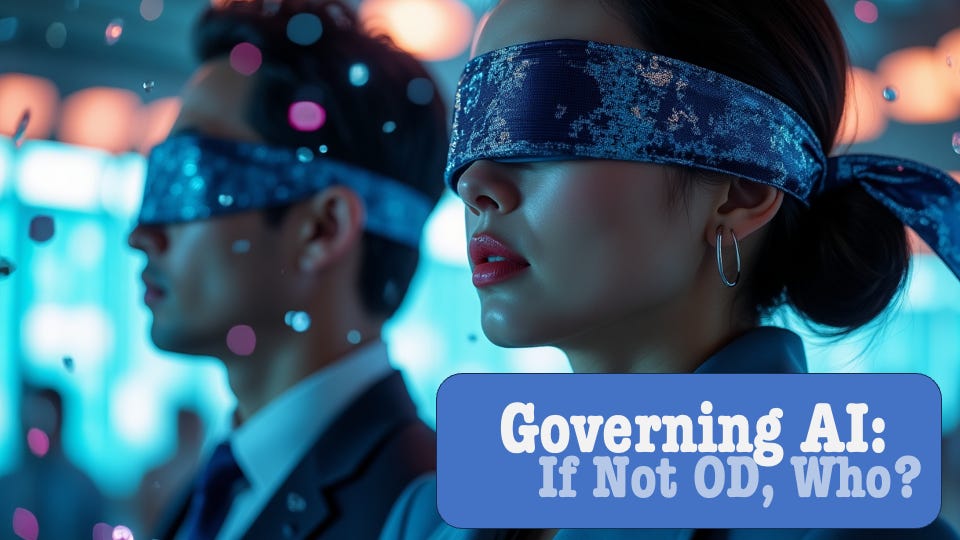The Question That Changed Everything
While on an AI ethics and responsible deployment course, the conversation turned to a critical point. We acknowledged the absence—and inadequacy—of AI regulations, policies, and ethics beyond general practices and common sense. Then the CEO asked a powerful question:
“But who will ensure that our bank stays updated and compliant with the latest AI trends, laws, and best practices?”
The room fell silent. Typical answers like “None,” “Everybody,” or “We don’t use AI” didn’t hold up—not anymore.
That’s when it hit me: This is a question for OD.
Why OD Could Lead AI Governance
As AI becomes embedded in everything in our organization lives, from recruitment to customer service and risk assessment, OD professionals are uniquely positioned to lead its governance. We’ve always focused on systems, culture, and change—three areas where AI introduces massive disruption and opportunity.
AI governance isn’t just an IT, data or legal issue, anymore. It’s an OD concern as well.
What Is AI Governance, Really?
AI governance refers to the frameworks, policies, and practices that ensure AI is developed and used ethically, transparently, and responsibly. It acts as a set of organizational guardrails that ensure AI:
- Aligns with values and mission
- Minimizes risks (e.g., bias, data privacy, cybersecurity)
- Delivers real value to stakeholders
- Enhances trust and accountability
In short: AI governance protects people, culture, and purpose.
Getting Started: What OD Can Do Now
1. Seed an AI Team
Start small. Tap into those who’ve joined AI learning sessions. Form an informal AI working group. From there, assess each unit’s AI readiness through OD lenses:
- Human involvement in decision-making
- Privacy & data handling
- Organizational structure
- Stakeholder impact
- Potential AI applications
This diagnostic can evolve into a governance maturity (or readiness) profile tailored to your organization.
2. Define Ethical and Responsible AI Use
Responsible AI means making systems transparent, accountable, and aligned with human values. OD practitioners can:
- Facilitate values-driven discussions
- Co-create AI ethics guidelines
- Embed accountability into team structures
3. Explore AI Governance Structures
Should governance be centralized (one AI oversight body), decentralized (distributed AI champions), or hybrid? OD helps define the structure based on culture, capacity, and change readiness.
4. Scan the Environment
While laws may lag, models and practices already exist. Encourage your AI team to:
- Review global AI governance frameworks (e.g., OECD, EU, NIST)
- Document and share internal use cases
- Draft initial guidelines for responsible experimentation
5. Enable Cross-Functional Collaboration
AI governance is a team sport. Facilitate collaboration among IT, HR, data analytics, legal, operations, and business units. Each brings a critical lens to how AI is designed, used, and evaluated.
Evolving the Team: From Task Force to AI Governance Committee
1. Strategy Alignment
Ensure all AI initiatives support the organization’s vision, mission, and strategic goals.
Why it matters: Prevents fragmented AI projects and boosts organizational coherence.
2. Risk Management
Monitor AI-related risks: algorithmic bias, data privacy, compliance issues, etc.
Why it matters: Avoids reputational damage and regulatory pitfalls.
3. Policy and Standards Development
Draft internal AI policies and keep them up to date.
Why it matters: Creates a culture of consistency, trust, and continuous improvement.
4. Monitoring and Evaluation
Track outcomes and impacts of AI initiatives.
Why it matters: Maintains system integrity and public trust while allowing for iteration.
5. Education and Training
Equip employees with the mindset and skillset for responsible AI use.
Why it matters: Reduces fear, improves adoption, and ensures ethical practice.
6. Industry Collaboration
Engage in dialogue with academia, government, and industry to shape AI best practices.
Why it matters: Positions your organization as a responsible, future-ready leader.
Conclusion: OD as Stewards of the AI Future
AI is no longer a distant technology—it’s here, and it's shaping how organizations operate. But without governance, even the most promising AI tools can create risk, confusion, and harm.
If not OD, who?
We understand systems. We design change. We work with culture, ethics, and values. That makes OD professionals essential to building responsible, ethical, and adaptive AI governance structures.
Let’s lead—not just the AI conversation, but the AI transformation!
NOTES
1. Basic ODPN Courses
1.1. OD Conversation: ODPN with Ateneo Center for Organization Research and Development (Ateneo CORD), Transforming Philippine Organizations to A Culture of Sustainability, Wednesday, May 21,2025, 4:00-6:00pm, via zoom with Dr Vanessa Villaluz, Ms Irene Maranan and Mr Jun Roy.
1.2. In-person from 8am-5pm in the Meralco Power Tech, Ortigas on the dates mentioned: (a) Diagnosing Organizations, Dr Joy Teng-Calleja, PhD, RPsy, June 17 (b) Designing Effective OD Interventions, Dr Melissa Reyes, PhD, August 20 and (c) Process Observation and Analysis, Dr Josephine Perez, PhD, RPsy, September 18.
2. RESERVE A SEAT NOW! The ODPN’s ODLab25: Force for GoOD will be held late July 31 to Aug 1 in Martian Hotel, Zamboanga City. Get the Brochure and Register here or message or call ODPN Secretariate 0925.553.2342.
3. Forthcoming Ed Canela’s AI Seminar Series
3.1. AI for Teachers and Educators on June 5, 6, and 7, 2025 (8:00 to 12:00 NN Zoom), Leadership in the Digital Era, June 9 (8:00 to 12:00 NN Zoom) and Basic OD July 5 (8:00 to 12:00 NN Zoom), SAIDI Graduate School of Organizational Development and Planning. Contact: Ms Cynthia Cruz AT cecruz@SA
3.2. Basic AI: Efficiency with Responsibility (AI for Book Publishing): 3 Cohorts (by invites only) May 21 (2 cohorts) and May 22.
3. 3. Aid4Business (for MSMEs) Institute for Small Scale Industries University of the Philippines (UP ISSI) 14 to 16, October 2025. Register here.




